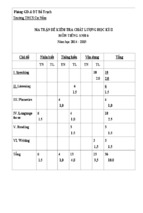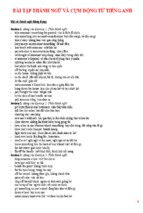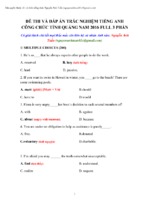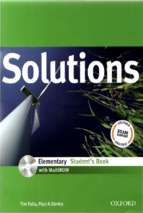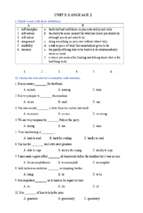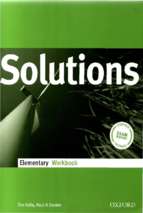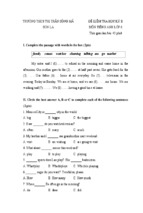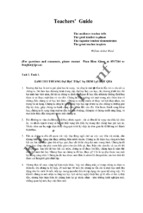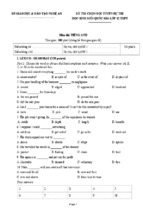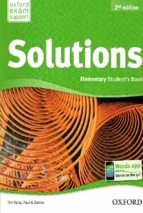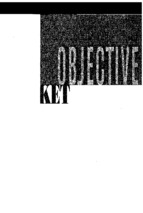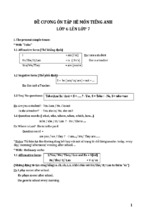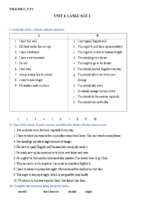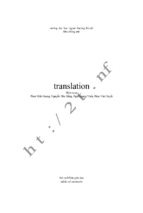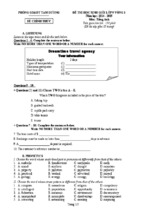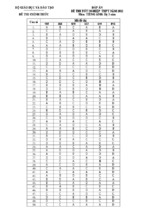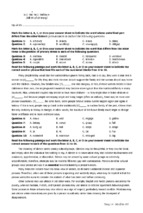DÀNH CHO HỌC SINH THI KHỐI D , THI CHUYỂN CẤP , CHUYÊN ANH
visit the link to get test
Website : https://1001dethi.com/ dt 0909265875 .thầy phúc
SÁCH STARTERS :
Cụ thể : 1 bộ sách Starters 9 cuốn +audio listening
Trọn gói : 50.000Đ.
SÁCH MOVERS :
Cụ thể : 1 bộ sách Movers 9 cuốn + audio listening
Trọn gói : 50.000Đ.
SÁCH FLYERS :
Cụ thể : 1 bộ sách Flyers 9 cuốn +audio listening
Trọn gói : 50.000Đ
SÁCH KET :
Cụ thể : 1 bộ sách KET 10 cuốn +audio listening
Trọn gói : 50.000Đ
SÁCH PET :
Cụ thể : 1 bộ sách PET 8 cuốn +audio listening
Trọn gói : 40.000Đ
SÁCH Longman New Real Toeic (Trọn bộ 3 cuốn RC,LC và Full)
Trọn gói : 30.000Đ
BỘ GIÁO DỤC VÀ ĐÀO TẠO
( Ôn thi ĐH, CĐ khối D1, A1)
NHÀ XUẤT BẢN GIÁO DỤC
BÔ GIÁO DỤC VÀ ĐÀO TẠO
LỚP CĐSTOAN11
Bộ đề thi môn
TIẾNG ANH
2008 - 2012
(Ôn thi ĐH, CĐ khối D1, A1)
( In lần thứ nhất )
NHÀ XUẤT BẢN GIÁO DỤC
Lớp CĐSTOAN11 giữ bản quyền tài liệu, nghiêm cấm sao in dưới mọi hình
thức
766/GD-19/7125/980-12
BỘ GIÁO DỤC VÀ ĐÀO TẠO
ĐỀ CHÍNH THỨC
Mã số: 4U321H79
ĐỀ THI TUYỂN SINH ĐẠI HỌC, CAO ĐẲNG NĂM 2008
Môn thi: TIẾNG ANH, khối D
Thời gian làm bài: 90 phút.
(Đề thi có 05 trang)
Mã đề thi 978
Họ, tên thí sinh:......................................................................
Số báo danh:...........................................................................
...
ĐỀ THI GỒM 80 CÂU (TỪ CÂU 1 ĐẾN CÂU 80) DÀNH CHO TẤT CẢ THÍ SINH.
Chọn phương án (A hoặc B, C, D) ứng với từ có trọng âm chính nhấn vào âm tiết có vị trí khác với ba
từ còn lại trong mỗi câu.
Câu 1:
A. preferential
B. development
C. preservative
D. congratulate
Câu 2:
A. potential
B. understand
C. recommend
D. volunteer
Câu 3:
A. physicist
B. inventor
C. president
D. property
Câu 4:
A. particular
B. unemployment
C. communicate
D. economy
Câu 5:
A. apply
B. persuade
C. reduce
D. offer
Chọn phương án đúng (A hoặc B, C, D) để hoàn thành mỗi câu sau.
Câu 6: He’s a very ______ person because he can make other workers follow his advice.
A. creative
B. influential
C. deciding
D. effective
Câu 7: - Janet: "Do you feel like going to the cinema this evening?"
- Susan: "______."
A. I don't agree, I'm afraid
B. You’re welcome
C. That would be great
D. I feel very bored
Câu 8: How long does the play ______?
A. extend
B. stretch
C. prolong
D. last
Câu 9: The doctor decided to give her a thorough examination ______ he could identify the causes of her
illness.
A. so as
B. so that
C. unless
D. after
Câu 10: Increasing ______ of fruit in the diet may help to reduce the risk of heart disease.
A. an amount
B. the number
C. the amount
D. a number
Câu 11: It is blowing so hard. We ______ such a terrible storm.
A. had never known
B. have never been knowing
C. never know
D. have never known
Câu 12: - "Why wasn't your boyfriend at the party last night?"
- "He ______ the lecture at Shaw Hall. I know he very much wanted to hear the speaker."
A. should have attended B. can have attended
C. was to attend
D. may have attended
Câu 13: - Laura: “What a lovely house you have!”
- Maria: “_______.”
A. Of course not, it’s not costly
B. I think so
C. Thank you. Hope you will drop in
D. No problem
Câu 14: The room needs ______ for the wedding.
A. to decorate
B. decorating
C. decorate
D. be decorated
Câu 15: I’m afraid I’m not really ______ to comment on this matter.
A. qualified
B. quality
C. qualifying
D. qualitative
Câu 16: I'm sure you'll have no ______ the exam.
A. difficulty to pass
B. difficulties to pass
C. difficulties of passing D. difficulty passing
Câu 17: Today, household chores have been made much easier by electrical ______.
A. appliances
B. utilities
C. instruments
D. applications
Câu 18: My computer is not ______ of running this software.
A. compatible
B. suitable
C. capable
D. able
Câu 19: That hotel is so expensive. They ______ you sixty pounds for bed and breakfast.
A. take
B. fine
C. charge
D. cost
Câu 20: When the old school friends met, a lot of happy memories ______ back.
A. had been brought
B. brought
C. had brought
D. were brought
Trang 1/5 - Mã đề thi 978
Câu 21: The referee ______ the coin to decide which team would kick the ball first.
A. caught
B. cast
C. threw
D. tossed
Câu 22: I accidentally ______ Mike when I was crossing a street downtown yesterday.
A. caught sight of
B. paid attention to
C. lost touch with
D. kept an eye on
Câu 23: The curtains have ______ because of the strong sunlight.
A. lightened
B. faded
C. fainted
D. weakened
Câu 24: I am considering ______ my job. Can you recommend a good company?
A. changing
B. to move
C. to change
D. moving
Câu 25: The price of fruit has increased recently, ______ the price of vegetables has gone down.
A. whether
B. whereas
C. otherwise
D. when
Đọc kỹ đoạn văn sau và chọn phương án đúng (A hoặc B, C, D) cho mỗi câu từ 26 đến 35.
The Sun today is a yellow dwarf star. It is fueled by thermonuclear reactions near its center that convert
hydrogen to helium. The Sun has existed in its present state for about four billion six hundred million years and
is thousands of times larger than the Earth.
By studying other stars, astronomers can predict what the rest of the Sun’s life will be like. About five
billion years from now, the core of the Sun will shrink and become hotter. The surface temperature will fall. The
higher temperature of the center will increase the rate of thermonuclear reactions. The outer regions of the Sun
will expand approximately 35 million miles, about the distance to Mercury, which is the closest planet to the
Sun. The Sun will then be a red giant star. Temperatures on the Earth will become too high for life to exist.
Once the Sun has used up its thermonuclear energy as a red giant, it will begin to shrink. After it
shrinks to the size of the Earth, it will become a white dwarf star. The Sun may throw off huge amounts of
gases in violent eruptions called nova explosions as it changes from a red giant to a white dwarf.
After billions of years as a white dwarf, the Sun will have used up all its fuel and will have lost its heat.
Such a star is called a black dwarf. After the Sun has become a black dwarf, the Earth will be dark and cold. If
any atmosphere remains there, it will have frozen over the Earth’s surface.
Câu 26: It can be inferred from the passage that the Sun ______.
A. is approximately halfway through its life as a yellow dwarf
B. will continue to be a yellow dwarf for another 10 billion years
C. has been in existence for 10 billion years
D. is rapidly changing in size and brightness
Câu 27: What will probably be the first stage of change for the Sun to become a red giant?
A. It will throw off huge amounts of gases.
B. Its central part will grow smaller and hotter.
C. Its surface will become hotter and shrink.
D. Its core will cool off and use less fuel.
Câu 28: When the Sun becomes a red giant, what will the atmosphere be like on the Earth?
A. It will be enveloped in the expanding surface of the sun.
B. It will freeze and become solid.
C. It will become too hot for life to exist.
D. It will be almost destroyed by nova explosions.
Câu 29: When the Sun has used up its energy as a red giant, it will ______.
A. cease to exist
B. stop to expand
C. get frozen
D. become smaller
Câu 30: Large amounts of gases may be released from the Sun at the end of its life as a ______.
A. red giant
B. white dwarf
C. yellow dwarf
D. black dwarf
Câu 31: As a white dwarf, the Sun will be ______.
A. thousands of times smaller than it is today
B. the same size as the planet Mercury
C. around 35 million miles in diameter
D. a cool and habitable planet
Câu 32: The Sun will become a black dwarf when ______.
A. the Sun moves nearer to the Earth
B. the outer regions of the Sun expand
C. it has used up all its fuel as a white dwarf
D. the core of the Sun becomes hotter
Câu 33: The word “there” in the last sentence of paragraph 4 refers to ______.
A. the planet Mercury
B. our own planet
C. the core of a black dwarf
D. the outer surface of the Sun
Câu 34: This passage is intended to ______.
A. discuss conditions on the Earth in the far future
B. describe the changes that the Sun will go through
C. present a theory about red giant stars
D. alert people to the dangers posed by the Sun
Câu 35: The passage has probably been taken from ______.
A. a news report
B. a work of science fiction
C. a scientific chronicle
D. a scientific journal
Trang 2/5 - Mã đề thi 978
Đọc kỹ đoạn văn sau và chọn phương án đúng (A hoặc B, C, D) cho mỗi câu từ 36 đến 45.
Reading to oneself is a modern activity which was almost unknown to the scholars of the classical and
medieval worlds, while during the fifteenth century the term “reading” undoubtedly meant reading aloud. Only
during the nineteenth century did silent reading become commonplace.
One should be wary, however, of assuming that silent reading came about simply because reading aloud
was a distraction to others. Examinations of factors related to the historical development of silent reading have
revealed that it became the usual mode of reading for most adults mainly because the tasks themselves
changed in character.
The last century saw a steady gradual increase in literacy and thus in the number of readers. As the
number of readers increased, the number of potential listeners declined and thus there was some reduction in
the need to read aloud. As reading for the benefit of listeners grew less common, so came the flourishing of
reading as a private activity in such public places as libraries, railway carriages and offices, where reading
aloud would cause distraction to other readers.
Towards the end of the century, there was still considerable argument over whether books should be
used for information or treated respectfully and over whether the reading of materials such as newspapers was
in some way mentally weakening. Indeed, this argument remains with us still in education. However, whatever
its virtues, the old shared literacy culture had gone and was replaced by the printed mass media on the one
hand and by books and periodicals for a specialised readership on the other.
By the end of the twentieth century, students were being recommended to adopt attitudes to books and
to use reading skills which were inappropriate, if not impossible, for the oral reader. The social, cultural and
technological changes in the century had greatly altered what the term “reading” implied.
Câu 36: Reading aloud was more common in the medieval world because ______.
A. people relied on reading for entertainment
B. there were few places available for private reading
C. few people could read to themselves
D. silent reading had not been discovered
Câu 37: The word “commonplace” in the first paragraph mostly means “______”.
A. attracting attention
B. most preferable
C. widely used
D. for everybody’s use
Câu 38: The development of silent reading during the last century indicated ______.
A. a change in the nature of reading
B. an increase in the average age of readers
C. an increase in the number of books
D. a change in the status of literate people
Câu 39: Silent reading, especially in public places, flourished mainly because of ______.
A. the development of libraries
B. the increase in literacy
C. the decreasing need to read aloud
D. the decreasing number of listeners
Câu 40: It can be inferred that the emergence of the mass media and specialised reading materials was an
indication of ______.
A. an alteration in educationalists’ attitudes
B. a decline of standards of literacy
C. a change in the readers’ interest
D. an improvement of printing techniques
Câu 41: The phrase “a specialised readership” in paragraph 4 mostly means “______”.
A. a requirement for readers in a particular area of knowledge
B. a limited number of readers in a particular area of knowledge
C. a status for readers specialised in mass media
D. a reading volume for particular professionals
Câu 42: The phrase “oral reader” in the last paragraph mostly means “a person who ______”.
A. practises reading to an audience
B. is interested in spoken language
C. is good at public speaking
D. takes part in an audition
Câu 43: All of the following might be the factors that affected the continuation of the old shared literacy culture
EXCEPT ______.
A. the diversity of reading materials
B. the specialised readership
C. the inappropriate reading skills
D. the printed mass media
Câu 44: Which of the following statements is NOT TRUE according to the passage?
A. Reading aloud was more common in the past than it is today.
B. The decline of reading aloud was wholly due to its distracting effect.
C. Not all printed mass media was appropriate for reading aloud.
D. The change in reading habits was partly due to the social, cultural and technological changes.
Câu 45: The writer of this passage is attempting to ______.
A. explain how reading habits have developed
B. show how reading methods have improved
C. change people’s attitudes to reading
D. encourage the growth of reading
Trang 3/5 - Mã đề thi 978
Chọn phương án đúng (A hoặc B, C, D) ứng với câu có nghĩa gần nhất với mỗi câu cho sẵn sau đây.
Câu 46: We've run out of tea.
A. We have to run out to buy some tea.
B. There's not much more tea left.
C. We didn’t have any tea.
D. There's no tea left.
Câu 47: The sooner we solve this problem, the better it will be for all concerned.
A. If we could solve this problem soon, it would be better for all concerned.
B. If we can solve this problem soon, it will be better for all concerned.
C. It would be better for all concerned if we can solve this problem soon.
D. If all concerned are better, we can solve this problem soon.
Câu 48: "Why don’t we go out for dinner?” said Mary.
A. Mary suggested a dinner out.
B. Mary requested a dinner out.
C. Mary ordered a dinner out.
D. Mary demanded a dinner out.
Câu 49: "I will let you know the answer by the end of this week,” Tom said to Janet.
A. Tom offered to give Janet the answer by the end of the week.
B. Tom suggested giving Janet the answer by the end of the week.
C. Tom insisted on letting Janet know the answer by the end of the week.
D. Tom promised to give Janet the answer by the end of the week.
Câu 50: My friend told me, “If I were you, I would not smoke so much.”
A. My friend advised me not to smoke so much.
B. My friend suggested not smoking so much.
C. My friend prohibited me from smoking so much. D. My friend warned me against smoking so much.
Đọc kỹ đoạn văn sau và chọn phương án đúng (A hoặc B, C, D) cho mỗi chỗ trống từ 51 đến 60.
How men first learnt to (51)______ words is unknown; in other words, the origin of language is a
(52)______. All we really know is that men, unlike animals, (53)______ invented certain sounds to express
thoughts and feelings, actions and things so that they could communicate with each other; and that later they
agreed (54)______ certain signs, called letters, which could be combined to represent those sounds, and
which could be written down. These sounds, (55)______ spoken or written in letters, are called words.
Great writers are those who not only have great thoughts but also express these thoughts in words that
(56)______ powerfully to our minds and emotions. This charming and telling use of words is what we call
literary (57)______. Above all, the real poet is a master of words. He can (58)______ his meaning in words
which sing like music, and which by their position and association can (59)______ men to tears. We should,
therefore, learn to choose our words carefully, (60)______ they will make our speech silly and vulgar.
Câu 51:
A. discover
B. make
C. invent
D. create
Câu 52:
A. mystery
B. story
C. legend
D. secret
Câu 53:
A. somewhat
B. however
C. somehow
D. whatever
Câu 54:
A. to
B. upon
C. with
D. at
Câu 55:
A. though
B. if
C. however
D. whether
Câu 56:
A. lure
B. interest
C. attract
D. appeal
Câu 57:
A. prose
B. style
C. work
D. form
Câu 58:
A. transmit
B. convey
C. transfer
D. carry
Câu 59:
A. move
B. send
C. take
D. break
Câu 60:
A. because
B. although
C. or
D. so
Đọc kỹ đoạn văn sau và chọn phương án đúng (A hoặc B, C, D) cho mỗi chỗ trống từ 61 đến 70.
The heart has long been considered to be (61)______ feelings of love dwell. In love songs throughout the
ages, love almost always goes together (62)______ the heart. The heart has continuously been viewed
(63)______ the place where love begins and develops. Even the Bible gives (64)______ to love and the heart.
The role of the heart in love must come from what happens to it when a person feels strongly (65)______
to someone. The strong feelings (66)______ the other person, especially in the early stages of a relationship,
have the results that the heart starts beating faster and breathing starts speeding (67)______.
According to psychologists, a love relationship is a situation that (68)______ a lot of stress and the body
reacts to this by getting ready to face the unknown. This has been called the "fight or flight" (69)______,
meeting danger by fighting it or running away. So with love, the heart accelerates and (70)______ becomes
quick.
Câu 61:
Câu 62:
Câu 63:
Câu 64:
Câu 65:
A. that
A. with
A. as though
A. citation
A. attract
B. where
B. from
B. as if
B. reference
B. attracting
C. when
C. at
C. as
C. preference
C. attractive
D. what
D. to
D. like
D. quote
D. attracted
Trang 4/5 - Mã đề thi 978
Câu 66:
A. for
B. to
C. of
D. with
Câu 67:
Câu 68:
Câu 69:
Câu 70:
A. on
A. arouses
A. reacting
A. exhaling
B. forward
B. comprises
B. reactionary
B. sweating
C. up
C. includes
C. reaction
C. inhaling
D. upon
D. involves
D. reactor
D. breathing
Chọn phương án (A hoặc B, C, D) ứng với từ/cụm từ có gạch chân cần phải sửa để các câu sau trở
thành câu đúng.
Câu 71: A child of noble birth, his name was famous among the children in that school.
A
B
C
D
Câu 72: Helen likes to listen to music, to go to the cinema, to chat on the phone and going shopping.
A
B
C
D
Câu 73: Unlike many writings of her time, she was not preoccupied with morality.
A
B
C
D
Câu 74: Both Mr. and Mrs. Smith are explaining the children the rules of the game.
A
B
C
D
Câu 75: You can enjoy a sport without joining in a club or belonging to a team.
A
B
C
D
Mã đề thi
Chọn phương án đúng (A hoặc
hoàn thành
mỗi câu sau.
105B, C, D) để
342
589
613
846
978
Câu 76: Having been delayed by
heavy
traffic,
______.
D
B
A
D
B
A
1.
A. it was difficult for her to arrive on time
B. it was impossible for her to arrive on time
D
A
CD. she was B
A on time A
2. was intolerable
C. her being late
unable to arrive
Câu 77: ______, he
to continue
up the mountain.
C
B to climb B
D
A
B
3. was determined
A. As he might feel tired C
B.
He
felt
very
tired
though
D
D
C
C
B
4.
C. Tired as it was
D. Tired as he might feel
A
C
D
5. would haveBlearned howBto read. D
Câu 78: ______, he
A. Had he been
AB. If he could
A go to school
D as a child B
6.able to go toB school as aDchild
C. Were he able to go to school as a child
D. If he has been able to go school as a child
B
A
C
B
D
C
7.
Câu 79: The robbers attacked the owner of the house ______.
A with the expensive
D
A
D
B
D
A. so that they8.
would appear
painting
B. and disappeared
B
C
D
D
B
9. with theCexpensive painting
C. so they disappeared with the expensive painting
A expensiveCpainting
D
A
A
C
10. with the
D. but they appeared
D
C
C
D
11. told himDthat ______.C
Câu 80: She regretfully
A. she would have
at home
C
A
AB. she left the
C tickets at home
A
D
12. left the tickets
C. she had left the tickets at home
D. she would leave the tickets at home
C
C
A
B
A
C
13.
----------------------------------------------B
C
B
C
C
B
14.
---------------------------------------------------- HẾT ---------D
D
C
C
D
A
15.
B
A
B
B
C
D
16.
A
B
B
A
C
A
17.
D
C
D
B
B
C
18.
D
C
C
D
D
C
19.
C
B
A
D
A
D
20.
A
D
B
B
C
D
21.
A
C
D
C
B
A
22.
D
A
D
A
B
B
23.
A
A
D
C
D
A
24.
C
A
B
B
D
B
25.
B
B
A
C
A
A
26.
Trang 5/5
C
C
C
D
D
B - Mã đề thi 978
27.
A
D
B
D
D
C
28.
ĐÁP
ÁN
D
C
C
D
C
D
29.
BỘ GIÁO DỤC VÀ ĐÀO TẠO
ĐỀ
THI
TUYỂN
SINH
ĐẠI
HỌC,
CAO
ĐẲNG
B
A
C
C
B
A NĂM 2008
30.
Môn:
khối D A
D
D
D TIẾNG ANH,
B
31.THỨC A
ĐỀ CHÍNH
A
D
B
A
D
C
32.
A
A
D
B
A
B
33.
A
A
B
C
B
B
34.
B
B
A
B
B
D
35.
A
A
C
C
B
C
36.
B
D
D
B
B
C
37.
D
D
A
B
A
A
38.
A
D
B
D
C
B
39.
B
A
C
A
B
C
40.
Câu số
1
Câu số
2
105
342
Mã đề thi
589
613
846
978
A
D
D
A
C
B
41.
C
B
C
B
B
A
42.
B
B
D
D
A
C
43.
D
C
C
C
A
B
44.
C
D
D
B
D
A
45.
D
A
A
D
D
D
46.
B
B
B
A
A
B
47.
C
B
C
A
C
A
48.
A
B
A
D
A
D
49.
A
C
A
C
D
A
50.
A
C
A
A
B
C
51.
C
C
B
C
B
A
52.
D
B
D
D
C
C
53.
ĐỀ THI
B
A
B TUYỂNCSINH CAODĐẲNG NĂM
B 2008
54.
BỘ GIÁO DỤC VÀ ĐÀO TẠO
Môn thi:
khối DD
C
D
C
A TIẾNG ANH,
B
55.
ThờiBgian làm bài:
D
B
C 90 phút. D
56. THỨC B
ĐỀ CHÍNH
(Đề thi có
C
A
B
B
B
57.06 trang) D
B
A
C
B
C
B
58.
D
D
D
A
A
A
59.
Mã đề thi 981
A
C
D
A
C
C
60.
B
D
A
C
B
Họ, tên thí sinh:......................................................................
... C
61.
Số báo danh:...........................................................................
C
C
C
A
A
A
62.
ĐỀ THI GỒM 80 63.
CÂU (TỪ CÂU
TẤT CẢCTHÍ SINH. A
C 1 ĐẾN CÂU
A 80) DÀNH CHO
A
C
C
C
C
C
C
C
64.
Chọn phương án đúng (A hoặc B, C, D) ứng với câu có nghĩa gần nhất với mỗi câu cho sẵn sau đây.
D
B
A
A
A
D
Câu 1: I can’t help65.
feeling worried about Tom.
B
C
DB. I find it impossible
D
A. I cannot help66.
Tom stop worrying.
not D
to worry aboutATom.
C. I can do nothing
A
A
BD. I don’t worry
C about Tom.
B
C
67. to help Tom.
Câu 2: Because she68.
was irritatedCby her husband’s
sheBleft him.
A lack of punctuality,
B
B
D
A. Irritated by her husband, she punctually left him.
C
D
B
B
D
C
69.
B. She left her husband because of her irritation with his lack of punctuality.
B
C
D
70.by her husband’s
C. Being irritating
lack ofApunctuality, B
she left him. A
D. Irritating with
she left
D lack of punctuality,
B
D him.
D
D
B
71.her husband’s
Câu 3: We were all72.
surprised when
D she suddenly
B came back.B
D
B
D
A. She was surprised, coming back suddenly.
D
C
C
B
A
A
73.
B. All of us found it surprising that she suddenly came back.
C
B come back. A
B
C
D
C. The fact that74.
we were surprised
made her
D. All of us were
amazing
to
see
her
come
back.
B
B
B
C
D
C
75.
Câu 4: She usually76.
drinks a glassDof milk before
going
to
bed
every
night.
D
C
A
A
D
A. She used to drink a glass of milk before going to bed every night.
D
C
D
D
A
D
77.
B. She is used to
going to bed before drinking a glass of milk every night.
C
D
A
D
A
78.
C. She gets accustomed
to a glass
of milk before
going toA bed every night.
D. She is used to
drinking a glass
going toAbed every night.
A of milk before
A
D
D
B
79.
Câu 5: Before we80.
can judge a Bgovernment’sBsuccess, weChave to decide
A the criteria,
C such as unemployment,
C
defense, or taxation.
A. We should judge a government’s success on the basis of the following criteria: unemployment, defense
and taxation.
B. We cannot judge a government’s success without first deciding the relevant criteria, such as
unemployment, defense or taxation.
C. Unemployment, defense and taxation are the criteria upon which we can judge a government’s success.
D. We cannot decide on criteria on unemployment, defense and taxation unless we have judged a
government’s success.
Chọn phương án (A hoặc B, C, D) ứng với từ có trọng âm chính nhấn vào âm tiết có vị trí khác với ba từ
còn lại trong mỗi câu.
Câu 6:
A. community
B. particular
C. mathematics
D. authority
Câu 7:
A. decision
B. refusal
C. politics
D. possession
Câu 8:
A. receive
B. process
C. factor
D. proper
Chọn phương án (A hoặc B, C, D) ứng với từ/ cụm từ có gạch chân cần phải sửa để các câu sau trở thành
câu đúng.
Câu 9: The British national anthem, calling “God Save the Queen”, was a traditional song in
A
B
C
D
the 18th century.
Câu 10: My mother doesn’t care how much does the washing machine cost because she
A
B
C
is going to buy it anyway.
D
Trang 1/6 - Mã đề thi 981
Câu 11: It is time the government helped the unemployment to find some jobs.
A
B
C
D
Câu 12: Due of the government’s policy, some farming areas have been abandoned.
A
B
C
D
Câu 13: Nora hardly never misses an opportunity to play in the tennis tournaments.
A
B
C D
Đọc kỹ đoạn văn sau và chọn phương án đúng (ứng với A hoặc B, C, D) cho mỗi câu từ 14 đến 23.
It is hard to think of a world without gas or electricity. Both are commonly used for lighting and heating
today. We now can instantly flick a lighter or strike a match to make a flame. But it was not long ago that
there were no such things as matches or lighters. To make fire, it was necessary to strike a piece of iron on flint
for sparks to ignite some tinder. If the tinder was damp, or the flint old, you had to borrow some fire from a
neighbor.
We do not know exactly when or how people first used fire. Perhaps, many ages ago, they found that sticks
would burn if they were dropped into some hole where melted lava from a volcano lay boiling. They brought
the lighted sticks back to make their fire in a cave. Or, they may have seen trees catch fire through being struck
by lightning, and used the trees to start their own fires.
Gradually people learned they could start a fire without traveling far to find flames. They rubbed two pieces
of wood together. This method was used for thousands of years.
When people became used to making fires with which to cook food and stay warm at night, they found that
certain resins or gums from trees burnt longer and brighter. They melted resins and dipped branches in the
liquid to make torches that lit their homes at night. Iron stands in which torches used to be fixed can still be
seen in old buildings of Europe.
There was no lighting in city streets until gas lamps, and then electric lamps were installed. Boys ran about
London at night carrying torches of burning material. They were called torch boys, or link boys, and earned a
living by guiding visitors to friends’ houses at night.
For centuries homes were lit by candles until oil was found. Even then, oil lamps were no more effective
than a cluster of candles. We read about the splendors and marvels of ancient palaces and castles, but we
forget that they must have been gloomy and murky places at night.
Câu 14: The word “lighter” in the passage mostly means ______.
A. the energy from the sun, a lamp, etc. that makes it possible to see things
B. a hot bright stream of burning gas that comes from something that is on fire
C. a device that uses electricity, oil or gas to produce light
D. a small device that produces a flame for lighting cigarettes, etc.
Câu 15: To make a fire in times just before the advent of matches, it was essential to have access to ______.
A. a burning fire or to possess flint
B. flint, iron and dry tinder
C. a burning fire or to possess iron
D. a magnifying glass
Câu 16: The first fire used by people was probably obtained ______.
A. by rubbing wood together
B. from heat or fire caused by nature
C. from the sun’s heat through glass
D. by striking iron against flint
Câu 17: Torches for lighting were made from ______.
A. the wood of gum trees
B. iron bars dipped in melted resins
C. tree branches dipped in melted resins
D. wooden poles dipped in oil
Câu 18: Before the electric lamp was invented ______.
A. people did not use any form of lighting in their houses
B. oil lamps and then candles were used
C. candles and then oil lamps were used
D. candles and oil lamps appeared about the same time
Câu 19: The word “splendors” in the passage mostly means ______.
A. wonderful things that have been achieved
B. places where a lot of people go on holiday
C. the beautiful and impressive features of a place
D. things that fill one with surprise and admiration
Câu 20: Which sentence is NOT TRUE according to the passge?
Trang 2/6 - Mã đề thi 981
A. Matches and lighters were invented not long ago.
B. We know exactly when and how people first used fire.
C. We can make a fire by striking a piece of iron on flint to ignite some tinder.
D. A world is impossible without gas or electricity.
Câu 21: The word “gloomy” in the passage mostly means ______.
A. full of light; having the natural light of day
B. totally covered with darkness
C. badly lit in a way that makes one feel sad
D. containing a lot of white
Câu 22: What form of street lighting was used in London when link boys used to work there?
A. Gas lighting.
B. Electric lighting.
C. No lighting at all.
D. Oil lighting.
Câu 23: The best title for the passage could be ______ .
A. Prehistoric People and Fire
B. Different Types of Lamps
C. The Advantages of Candles
D. Fire: Discovery and Uses
Chọn phương án đúng (ứng với A hoặc B, C, D) để hoàn thành mỗi câu sau.
Câu 24: He looks thin, but ______ he is very healthy.
A. actually
B. practically
C. consequently
D. also
Câu 25: I would really ______ your help with this assignment.
A. take
B. respect
C. thank
D. appreciate
Câu 26: - “Has an announcement been made about the eight o’clock flight to Paris?”
- “ _______.”
A. Yes, it was
B. Sorry, I don’t
C. I don’t think that
D. Not yet
Câu 27: Don’t worry. He’ll do the job as _______ as possible.
A. economizing
B. economic
C. economically
D. uneconomically
Câu 28: The ______ reason why I don’t want to move is that I’m perfectly happy here.
A. main
B. big
C. large
D. great
Câu 29: - “Would you mind lending me your bike?”
- “ ______ .”
A. Yes. Here it is
B. Not at all
C. Yes, let’s
D. Great
Câu 30: ______ entering the hall, he found everyone waiting for him.
A. On
B. At
C. During
D. With
Câu 31: Be ______ with what you have got, Mary.
A. satisfied
B. humorous
C. interested
D. suspicious
Câu 32: Can you keep calm for a moment? You ______ noise in class!
A. are always making
B. always make
C. have always made
D. are always made
Câu 33: If people ______ after their houses properly, the police wouldn’t have so much work to do.
A. should look
B. look
C. have looked
D. looked
Câu 34: They would ______ go by air than travel by train.
A. rather
B. better
C. prefer
D. always
Câu 35: - “________ detective stories?”
- “In my opinion, they are very good for teenagers.”
A. How about
B. Are you fond of
C. What do you think about
D. What do people feel about
Câu 36: He arrived late, ______ was annoying.
A. it
B. that
C. which
Câu 37: I’ve just been told some ______ news.
A. astonished
B. astonishing
C. astonishment
Câu 38: Take the number 5 bus and get ______ at Times Square.
A. outside
B. down
C. up
Câu 39: The manager had his secretary ______ the report for him.
A. type
B. typed
C. to have typed
Câu 40: I ______ this letter around for days without looking at it.
A. carry
B. have been carrying
C. will be carrying
D. what
D. astonish
D. off
D. to type
D. am carrying
Câu 41: The window was so high up that ______ I could see was the sky.
Trang 3/6 - Mã đề thi 981
A. just
B. thus
C. all
D. only
Câu 42: If you are not Japanese, so what _______ are you?
A. national
B. nationalized
C. nationality
D. nation
Câu 43: It was not until she had arrived home ______ remembered her appointment with the doctor.
A. when she had
B. she
C. and she
D. that she
Đọc kỹ đoạn văn sau và chọn phương án đúng (ứng với A hoặc B, C, D) cho mỗi chỗ trống từ 44 đến 53.
Around the age of sixteen, you must make one of the biggest decisions of your life. “Do I stay on at school
and hopefully go on to university (44)______? Do I leave and start work or begin a training (45)______?”
The decision is yours, but it may be (46)______ remembering two things: there is more unemployment
(47)______ those who haven’t been to university, and people who have the right (48)______ will have a big
advantage in the competition for jobs. If you decide to go (49)______ into a job, there are many opportunities
for training. Getting qualifications will (50)______ you to get on more quickly in many careers, and evening
classes allow you to learn (51)______ you earn. Starting work and taking a break to study when you are older
is (52)______ possibility. In this way, you can save up money for your student days, as well as (53)______
practical work experience.
Câu 44:
A. later
B. after
C. past
D. former
Câu 45:
A. term
B. class
C. course
D. school
Câu 46:
A. useful
B. worth
C. necessary
D. important
Câu 47:
A. of
B. among
C. through
D. between
Câu 48:
A. skills
B. interests
C. arts
D. habits
Câu 49:
A. straight
B. just
C. instant
D. direct
Câu 50:
A. give
B. make
C. let
D. help
Câu 51:
A. where
B. while
C. what
D. which
Câu 52:
A. another
B. always
C. again
D. also
Câu 53:
A. making
B. doing
C. taking
D. getting
Chọn phương án (A hoặc B, C, D) ứng với từ có phần gạch chân phát âm khác với ba từ còn lại trong mỗi
câu.
Câu 54:
A. ivory
B. writer
C. final
D. widow
Câu 55:
A. cleared
B. threatened
C. passed
D. managed
Đọc kỹ đoạn văn sau và chọn phương án đúng (ứng với A, hoặc B, C, D) cho mỗi câu từ 56 đến 65.
At the beginning of the nineteenth century, the American educational system was desperately in need of
reform. Private schools existed, but only for the very rich. There were very few public schools because of the
strong sentiment that children who would grow up to be laborers should not “waste” their time on education
but should instead prepare themselves for their life’s work. It was in the face of this public sentiment that
educational reformers set about their task. Horace Mann, probably the most famous of the reformers, felt that
there was no excuse in a republic for any citizen to be uneducated. As Superintendent of Education in the state
of Massachusetts from 1837 to 1848, he initiated various changes, which were soon matched in other school
districts around the country. He extended the school year from five to six months and improved the quality of
teachers by instituting teacher education and raising teacher salaries. Although these changes did not bring
about a sudden improvement in the educational system, they at least increased public awareness as to the need
for a further strengthening of the system.
Câu 56: The best title for the passage could be ______.
A. A Flight for Change
B. Nineteenth - the Century of Reform
C. American Education in the Beginning of the 19th Century
D. The Beginnings of Reform in American Education
Câu 57: The passage implied that to go to a private school, a student needed ______.
A. a strong educational background
B. good grades
C. a lot of money
D. a high level of intelligence
Câu 58: The word “desperately” in the passage mostly means ______.
Trang 4/6 - Mã đề thi 981
A. completely
B. partly
C. obviously
D. urgently
Câu 59: The author of the passage puts the word “waste” in quotation marks because he ______.
A. wants to emphasize how much time is wasted on education
B. thinks that education is not really a waste of time
C. is quoting someone else who said that education was a waste of time
D. does not want students to waste their time on education
Câu 60: According to the passage, Horace Mann wanted a better educational system for Americans because
______.
A. people had nothing else to do except go to school
B. education at the time was so cheap
C. all citizens should be educated in a republic
D. Massachusetts residents needed something to do with their spare time
Câu 61: The word “reformers” in the passage mostly means ______.
A. people who really enjoy teaching
B. people who work for the government
C. people who believe that education is wasted
D. people who try to change things for the better
Câu 62: The word “citizen” in the passage mostly means ______.
A. a person who lives in a particular city
B. a person who has the legal right to belong to a particular country
C. a person who works in a particular place
D. a person who works, especially one who does a particular kind of work
Câu 63: From 1837 to 1848, Horace Mann ______.
A. raised money for the educational development in Massachusetts
B. funded many projects to improve the educational system for Americans
C. worked as a headmaster in a school in the state of Massachusetts
D. managed education in the state of Massachusetts
Câu 64: According to the passage, which sentence is NOT TRUE?
A. Horace Mann brought about changes in many schools in the United States.
B. Horace Mann began raising teachers’ salaries.
C. Horace Mann was a famous US educational reformer.
D. Horace Mann suggested schools prepare children for their life’s work.
Câu 65: According to the passage, which of the following is a change that Horace Mann instituted?
A. Better teacher training.
B. The five-month school year.
C. Increased pay for students.
D. The matching of other districts’ policies.
Đọc kỹ đoạn văn sau và chọn phương án đúng (ứng với A hoặc B, C, D) cho mỗi chỗ trống từ 66 đến 75.
Everyone wants to reduce pollution. But the pollution problem is (66)______ complicated as it is serious. It
is complicated (67)______ much pollution is caused by things that benefit people. (68)______, exhaust from
automobiles causes a large percentage of air pollution. But the automobile (69)______ transportation for
millions of people. Factories discharge much (70)______ the material that pollutes the air and water, but
factories give employment to a large number of people.
Thus, to end (71)_______ greatly reduce pollution immediately, people would have to (72)______ using
many things that benefit them. Most of the people do not want to do that, of course. But pollution can be
(73)______ reduced in several ways. Scientists and engineers can work to find ways to lessen the (74)______
of pollution that such things as automobiles and factories cause. Governments can pass and enforce laws that
(75)______ businesses and traffic to stop, or to cut down on certain polluting activities.
Câu 66:
A. more
B. like
C. less
D. as
Câu 67:
A. while
B. though
C. so
D. because
Câu 68:
A. For example
B. Such as
C. Specific
D. Like
Câu 69:
A. affords
B. provides
C. carries
D. takes
Câu 70:
A. about
B. for
C. with
D. of
Câu 71:
A. as well
B. or
C. and
D. then
Câu 72:
A. continue
B. start
C. go on
D. stop
Câu 73:
A. gradually
B. little
C. carefully
D. unexpectedly
Câu 74:
A. amount
B. figure
C. way
D. number
Câu 75:
A. require
B. forbid
C. prevent
D. request
Chọn nhóm từ hoặc mệnh đề thích hợp (ứng với A hoặc B, C, D) để hoàn thành mỗi câu sau.
Trang 5/6 - Mã đề thi 981
Câu 76: He agreed to sign the contract ______.
A. so he didn’t know much about that company
B. because he didn’t know much about that company’s director
C. although he didn’t know much about that company
D. in spite he knew much about it
Câu 77: There were two small rooms in the beach house, ______ served as a kitchen.
A. the smallest of which
B. smallest of that
C. the smaller of which
D. the smaller of them
Câu 78: _______, they would have had what they wanted.
A. Had they arrived at the fair early
B. Supposing they were arriving at the fair early
C. Unless they arrived at the fair early enough
D. If they arrived at the fair early
Câu 79: John contributed fifty dollars, but he wishes he could contribute ______.
A. one other fifty dollars B. more fifty dollars
C. another fifty
D. the same amount also
Câu 80: John’s score on the test is the highest in the class. He ______.
A. should have studied all the time
B. must have studied very hard
C. should study very hard
D. must have to study well
--------------------------------------------------------------------------------------------------- HẾT ----------
Câu số
293
D
1.
BỘ GIÁO DỤC VÀ ĐÀO TẠO
C
2.
A
3.
ĐỀ CHÍNH THỨC
C
4.
D
5.
C
6.
A
7.
B
8.
D
9.
D
10.
B
11.
A
12.
B
13.
D
14.
C
15.
D
16.
A
17.
D
18.
A
19.
A
20.
B
21.
B
22.
B
23.
C
24.
D
25.
A
26.
D
27.
B
28.
D
29.
C
30.
A
31.
C
32.
C
33.
D
34.
D
35.
D
36.
C
37.
B
38.
378
A
C
D
Mã đề thi
406
529
C
A
Trang 6/6 - Mã đề thi 981
794
D
ĐÁP ÁN
981
B
B
B
B
ĐỀCTHI TUYỂN
SINH CAO
ĐẲNG NĂM
2008
B
B
A
Môn:
B TIẾNG ANH,
B khối D
B
C
D
D
C
A
C
D
B
D
C
D
C
C
A
C
C
D
C
C
A
A
A
A
D
D
D
A
B
B
A
D
A
B
B
D
D
D
C
C
D
A
B
A
C
B
D
D
A
B
B
B
B
D
A
C
A
C
B
B
C
B
C
B
A
C
D
D
C
A
C
D
B
C
C
C
B
C
C
D
A
D
A
B
A
A
A
C
C
D
D
C
A
C
C
D
B
C
D
C
B
C
A
A
A
C
C
B
D
D
D
A
B
D
C
B
D
A
C
D
B
B
D
A
B
D
A
B
B
B
A
C
D
A
B
C
D
D
A
A
D
C
D
A
C
C
A
D
D
A
C
B
B
A
B
A
D
D
C
B
B
B
C
C
C
B
A
A
B
A
A
B
A
D
1
Câu số
39.
40.
41.
42.
43.
44.
45.
46.
47.
48.
49.
50.
51.
52.
53.
54.
55.
56.
57.
58.
59.
60.
61.
62.
63.
64.
65.
66.
67.
68.
69.
70.
71.
72.
73.
74.
75.
76.
77.
78.
79.
80.
2
Mã đề thi
406
529
293
378
794
981
D
C
B
D
C
A
D
B
C
A
D
B
C
C
A
C
C
C
C
D
B
C
C
C
D
B
B
D
C
D
B
A
A
D
B
A
B
C
A
C
A
C
A
B
B
C
D
B
C
A
C
B
B
B
B
D
D
C
D
A
B
D
C
B
A
A
A
C
C
B
B
D
C
B
A
A
A
B
A
C
A
A
C
A
B
A
B
C
B
D
A
B
B
B
B
D
B
A
B
B
D
C
C
D
B
A
B
D
D
D
A
A
B
C
C
A
D
D
A
D
C
A
A
C
D
B
A
D
A
B
C
C
C
B
A
B
C
D
A
C
B
C
D
B
A
D
A
A
C
D
A
B
A
C
A
D
B
D
C
D
C
A
B
C
A
C
C
D
C
B
C
B
B
D
C
D
B
D
C
A
D
A
D
A
D
B
C
D
D
A
A
D
D
A
B
A
A
B
A
D
D
A
A
D
B
B
D
C
C
A
B
D
D
D
A
A
B
B
D
D
B
A
D
A
D
A
D
C
A
A
C
D
C
C
A
D
B
B
B
A
A
B
D
C
A
C
B
C
D
C
B
B
BỘ GIÁO DỤC VÀ ĐÀO TẠO
ĐỀ CHÍNH THỨC
ĐỀ THI TUYỂN SINH ĐẠI HỌC NĂM 2009
Môn: TIẾNG ANH; Khối: D
Thời gian làm bài: 90 phút, không kể thời gian phát đề
(Đề thi có 06 trang)
Mã đề thi 957
Họ, tên thí sinh:......................................................................
Số báo danh:...........................................................................
...
ĐỀ THI GỒM 80 CÂU (TỪ QUESTION 1 ĐẾN QUESTION 80)
Mark the letter A, B, C, or D on your answer sheet to indicate the sentence that is closest in
meaning to each of the following questions.
Question 1: He talked about nothing except the weather.
A. He talked about everything including the weather.
B. He had nothing to say about the weather.
C. His sole topic of conversation was the weather.
D. He said that he had no interest in the weather.
Question 2: Peter had very little money but managed to make ends meet.
A. Having little money, Peter couldn’t make ends meet.
B. Peter got by on very little money.
C. Peter could hardly live on little money.
D. Peter found it hard to live on very little money.
Question 3: The film didn’t come up to my expectations.
A. I expected the film to be more boring.
B. The film was as good as I expected.
C. I expected the film to end more abruptly.
D. The film fell short of my expectations.
Question 4: It doesn’t matter to them which film they go to.
A. Whatever films are shown, they never see.
B. They don’t mind which film they go to.
C. Which film they go to matters more than the cost.
D. They don’t care about the cost of the films they see.
Question 5: He survived the operation thanks to the skilful surgeon.
A. There was no skilful surgeon, so he died.
B. He survived because he was a skilful surgeon.
C. He wouldn’t have survived the operation without the skilful surgeon.
D. Though the surgeon was skilful, he couldn’t survive the operation.
Question 6: James was the last to know about the change of schedule.
A. The last thing James knew was the change of schedule.
B. Among the last people informed of the change of schedule was James.
C. At last James was able to know about the change of schedule.
D. Everyone had heard about the change of schedule before James did.
Question 7: There’s no point in persuading Jane to change her mind.
A. No one wants Jane to change her mind because it’s pointless.
B. Jane will change her mind though she doesn’t want to.
C. It’s possible for us to persuade Jane to change her mind.
D. It’s useless to persuade Jane to change her mind.
Question 8: She said, “John, I’ll show you round my city when you’re here.”
A. She planned to show John round her city.
B. She organized a trip round her city for John.
C. She promised to show John round her city.
D. She made a trip round her city with John.
Question 9: “Please don’t drive so fast, Tom,” said Lisa.
A. Lisa pleaded with Tom not to drive too fast.
B. Lisa grumbled to Tom about driving slowly.
C. Lisa insisted on Tom’s driving on.
D. Lisa complained about Tom’s driving too fast.
Trang 1/6 - Mã đề thi 957
Question 10: “Why don’t you reply to the President’s offer right now?” said Mary to her husband.
A. Mary wondered why her husband didn’t reply to the President’s offer then.
B. Mary suggested that her husband should reply to the President’s offer without delay.
C. Mary told her husband why he didn’t reply to the President’s offer then.
D. Mary ordered her husband to reply to the President’s offer right now.
Read the following passage and mark the letter A, B, C, or D on your answer sheet to indicate the
correct answer to each of the questions from 11 to 20.
Probably the most famous film commenting on the twentieth-century technology is Modern Times,
made in 1936. Charlie Chaplin was motivated to make the film by a reporter who, while interviewing
him, happened to describe the working conditions in industrial Detroit. Chaplin was told that healthy
young farm boys were lured to the city to work on automotive assembly lines. Within four or five
years, these young men’s health was destroyed by the stress of work in the factories.
The film opens with a shot of a mass of sheep making their way down a crowded ramp.
Abruptly, the film shifts to a scene of factory workers jostling one another on their way to a
factory. However, the rather bitter note of criticism in the implied comparison is not sustained. It is
replaced by a gentle note of satire. Chaplin prefers to entertain rather than lecture.
Scenes of factory interiors account for only about one-third of Modern Times, but they contain
some of the most pointed social commentary as well as the most comic situations. No one who has
seen the film can ever forget Chaplin vainly trying to keep pace with the fast-moving conveyor belt,
almost losing his mind in the process. Another popular scene involves an automatic feeding machine
brought to the assembly line so that workers need not interrupt their labor to eat. The feeding machine
malfunctions, hurling food at Chaplin, who is strapped in his position on the assembly line and cannot
escape. This serves to illustrate people’s utter helplessness in the face of machines that are meant to
serve their basic needs.
Clearly, Modern Times has its faults, but it remains the best film treating technology within a
social context. It does not offer a radical social message, but it does accurately reflect the sentiment of
many who feel they are victims of an over-mechanised world.
Question 11: According to the passage, Chaplin got the idea for Modern Times from ______.
A. fieldwork
B. a conversation
C. a newspaper
D. a movie
Question 12: The young farm boys went to the city because they were ______.
A. promised better accommodation
B. driven out of their sheep farm
C. forced to leave their sheep farm
D. attracted by the prospect of a better life
Question 13: The phrase “jostling one another” in the third paragraph is closest in meaning to
“______”.
A. jogging side by side
B. pushing one another
C. hurrying up together
D. running against each other
Question 14: According to the passage, the opening scene of the film is intended ______.
A. to produce a tacit association
B. to give the setting for the entire plot later
C. to introduce the main characters of the film D. to reveal the situation of the factory workers
Question 15: The word “vainly” in the fourth paragraph is closest in meaning to “______”.
A. hopelessly
B. recklessly
C. carelessly
D. effortlessly
Question 16: The word “This” in the fourth paragraph refers to ______.
A. the situation of young workers in a factory
B. the malfunction of the twentieth-century technology
C. the scene of an assembly line in operation
D. the scene of the malfunction of the feeding machine
Question 17: According to the author, about two-thirds of Modern Times ______.
A. is rather discouraging
B. entertains the audience most
C. is more critical than the rest
D. was shot outside a factory
Question 18: The author refers to all of the following notions to describe Modern Times EXCEPT
“______”.
A. entertainment
B. criticism
C. revolution
D. satire
Trang 2/6 - Mã đề thi 957
Question 19: Which of the following statements is NOT true according to the passage?
A. The working conditions in the car factories of the 1930s were very stressful.
B. The author does not consider Modern Times as a perfect film.
C. Modern Times depicts the over-mechanised world from a social viewpoint.
D. In Modern Times, the factory workers’ basic needs are well met.
Question 20: The passage was written to ______.
A. explain Chaplin’s style of acting
B. review one of Chaplin’s popular films
C. discuss the disadvantages of technology
D. criticize the factory system of the 1930s
Mark the letter A, B, C, or D on your answer sheet to indicate the word that differs from the rest in
the position of the main stress in each of the following questions.
Question 21: A. catastrophe
B. supervisor
C. agriculture
D. dictionary
Question 22: A. convenient
B. fashionable
C. traditional
D. significant
Question 23: A. abnormal
B. innocent
C. impatient
D. initial
Question 24: A. mosquito
B. elephant
C. buffalo
D. dinosaur
Question 25: A. protect
B. compose
C. relate
D. settle
Mark the letter A, B, C, or D on your answer sheet to show the underlined part that needs
correction.
Question 26: Bill was about average in performance in comparison with other students in his class.
A
B
C
D
Question 27: The media have produced live covering of Michael Jackson’s fans around the world
A
B
C
mourning for him.
D
Question 28: Although smokers are aware that smoking is harmful to their health, they can’t get rid it.
A
B
C
D
Question 29: Even though the extremely bad weather in the mountains, the climbers decided
A
B
not to cancel their climb.
C
D
Question 30: Found in the 12th century, Oxford University ranks among the world’s oldest universities.
A
B
C
D
Read the following passage and mark the letter A, B, C, or D on your answer sheet to indicate the
correct answer to each of the questions from 31 to 40.
Very few people in the modern world obtain their food supply by hunting and gathering in the
natural environment surrounding their homes. This method of harvesting from nature’s provision is the
oldest known subsistence strategy and has been practised for at least the last two million years. It was,
indeed, the only way to obtain food until rudimentary farming and the domestication of wild animals
were introduced about 10,000 years ago.
Because hunter-gatherers have fared poorly in comparison with their agricultural cousins, their
numbers have dwindled, and they have been forced to live in marginal environments, such as deserts
and arctic wastelands. In higher latitudes, the shorter growing seasons have restricted the availability
of plant life. Such conditions have caused a greater dependence on hunting, and on fishing along the
coasts and waterways. The abundance of vegetation in the lower latitudes of the tropics, on the other
hand, has provided a greater opportunity for gathering a variety of plants. In short, the environmental
differences have restricted the diet and have limited possibilities for the development of subsistence
societies.
Contemporary hunter-gatherers may help us understand our prehistoric ancestors. We know from
the observation of modern hunter-gatherers in both Africa and Alaska that a society based on hunting
and gathering must be very mobile. While the entire community camps in a central location, a smaller
party harvests the food within a reasonable distance from the camp. When the food in the area has
Trang 3/6 - Mã đề thi 957
become exhausted, the community moves on to exploit another site. We also notice seasonal
- Xem thêm -

